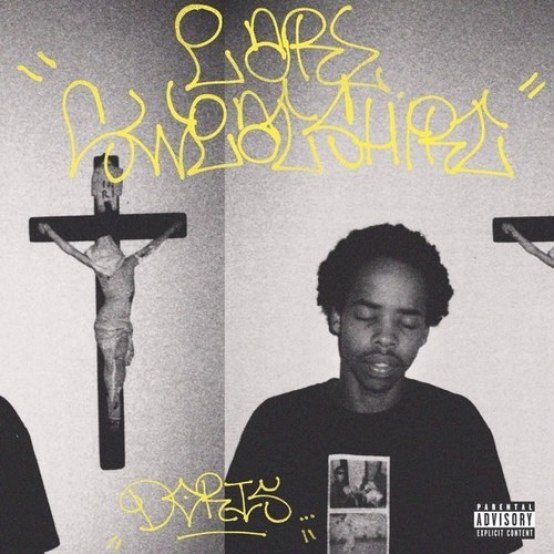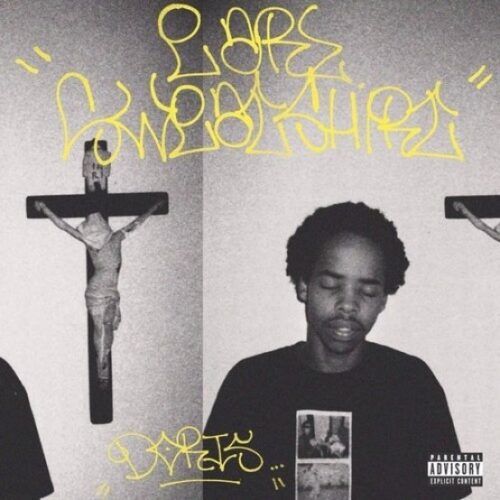There’s a reason that Odd Future inspired a million think pieces and it wasn’t just because they shocked white America. The truth is that this was an unruly, oddball rap collective that nobody really knew what to do with. They were hip hop’s tie-dye-wearing misfit nephew, just as likely to cite trap as an influence as old jazz records, psychedelic rock or Top 40 R&B. That can happen when you grow up on the internet where MF DOOM is only a click away from Waka Flocka Flame, and picking sides is pointless when you can enjoy both at no extra cost. "So what do you think of the Odd Future kids?" asked every tedious rap interview between 2010 and 2011, desperately prodding for leads that could help file Tyler and co. tidily away.
Amid all of that chaos was Earl, a baggy-eyed, expressionless teenage prodigy – indifferently spitting blood-splattered rape fantasies as though reciting times tables. He was a bored 16-year-old with an absent father, overstimulated in the depths of YouTube and looking to create his own worlds. Earl smoked marijuana for escapism, but he also escaped through words. You wouldn’t tell from his dead-eyed delivery, but his construction of language is joyfully intricate – stacking rhymes upon rhymes like a game of lyrical jenga. Go ahead and re-watch his breakthrough video for ‘Earl’, the imagery of its Jackass generation horrorcore just as unsettling now as it was then. Yet somehow, despite all of that extremity, it was Earl’s mumbling monotone that stole the spotlight, casually entering the public eye as a "hot and bothered astronaut crashing while jacking off to buffering vids of Asher Roth eating apple sauce."
For all of the group’s divisiveness, Earl is a talent that most can agree on – a reluctant overnight rap star burdened with the aligned hopes of giddy teens and old school purists. But little more than 26 minutes into his solo career, he was whisked off for treatment at a Samoan school for at-risk youths. Earl’s mythology only grew in his absence – he was off getting well, but in the meantime legions of kids were chanting ‘Fuck Earl’s Mom’ at shows around the world. The rest of Odd Future carried on as the YouTube hits spiralled into magazine covers and record deals, oblivious to the gaping mouth of the music industry that couldn’t wait to swallow them into its sterile digestive system.
Earl returned from Samoa just over a year ago as a legit famous rapper, recognised by airport security at LAX. His life is different now, but thankfully Doris carries the accompanying expectations better than his friend Tyler did. It’s easy to get caught up in the imagined possibilities of what Earl might be capable of, but that’s on us – because deep down he’s still that introvert who’d rather impress from the shadows than the limelight. When he does find himself centre stage, it’s only because his bandmates are scaling the speaker stacks and hanging from the light fittings. Of the 15 songs on Doris, nine begin with voices that aren’t Earl’s and one is instrumental. On top of that, there aren’t really any hooks, and when there are they’re as verbose as the verses, only repeated.
He expresses these apprehensions as early as the second song, ‘Burgundy’, which is Earl’s way of yelling at us to respect his humanity. Only he doesn’t yell – he never yells – he delivers his verse as a sigh over bright Neptunes brass, asking aloud why he’s working on music while his grandma – whose name gives the album its title – dies in a hospital. "Talk all you want I’m taking no advice / Nigga, I’m about to relish in this anguish," he continues, setting out his stall for the album ahead. ‘Chum’ follows shortly after, which was released last year and finds Earl at his most confessional. He explains in plain terms how his father’s absence left a gaping hole in his childhood, holding up his sorrow and insecurities like a white flag to those so desperate to interfere in his life. A sad, self-produced piano loop is all Earl needs to rap his heart out; his beats are nearly always understated, leaving his lyrics to tell the story without any heavy-handed musical guidance.
As great as these songs are, it’s right that Doris is not consumed by those themes as Earl’s not finished creating fantasy worlds just yet. The ultra-violence may be toned down, but he turns everyday teenage experiences – like driving around and taking drugs – into menacing night-time adventures for his imagination to run wild in. The murky basslines of ‘Sasquatch’ and ‘Hive’ make even the ordinary sound sinister, expertly demonstrating how a cycle to work can be twisted to sound vaguely threatening – "From a city that’s recession-hit / with stress, niggas could flex metal with, peddle to rake pennies in." At other times he’s simply high on his own gobbledygook, like during ‘Whoa’ when he swallows a nickel of hash and then dashes to St Nicholas’ pad to taste the reindeer. Tyler snarls something about his new range of socks in the background but his feature spots are upstaged by Vince Staples, whose swaggering verse on ‘Hive’ even outshines Earl’s.
Those marijuana-fuelled bars of Earl’s play a big role on Doris, and the drug has a grip on the album’s aesthetic too. Earl produces around half of the songs himself under the moniker randomblackdude, and his bleary, blunted production style feels at home with Los Angeles’ underground rap experiments. The Frank Ocean-featuring ‘Sunday’ is even more localised, with its jarring juxtapositions of sadness and west coast weather that wouldn’t feel out of place on Channel Orange. "All my dreams got dimmer when I stopped smoking pot," goes the chorus, following a verse of awkward apologies and garbled declarations of love. The likes of ‘Guild’ and the Samiyam-produced ’20 Wave Caps’ borrow more obviously from the low end theory crowd, while ‘Centurion’s Hammer Horror synths and the Forest Swordsian expansiveness of ‘Hoarse’ are two sonic highlights.
It’s all pretty much the same to Earl; his flow rarely switches up or makes any strong demand to be listened to, but the words keep on coming until it’s time for a feature or song break. It’s to Earl’s credit that he’s managed to make the music he wants to, even if it’s more of a rapper’s rap record than one of any major crossover appeal. But then, what else did we expect? At just 19 years old, Earl has a whole career ahead of him to expand his palette – but it’s more likely he’ll still be chasing the next simile; still lurking in the background of unglamorous, hook-free beats – impressing the hell out of us.



